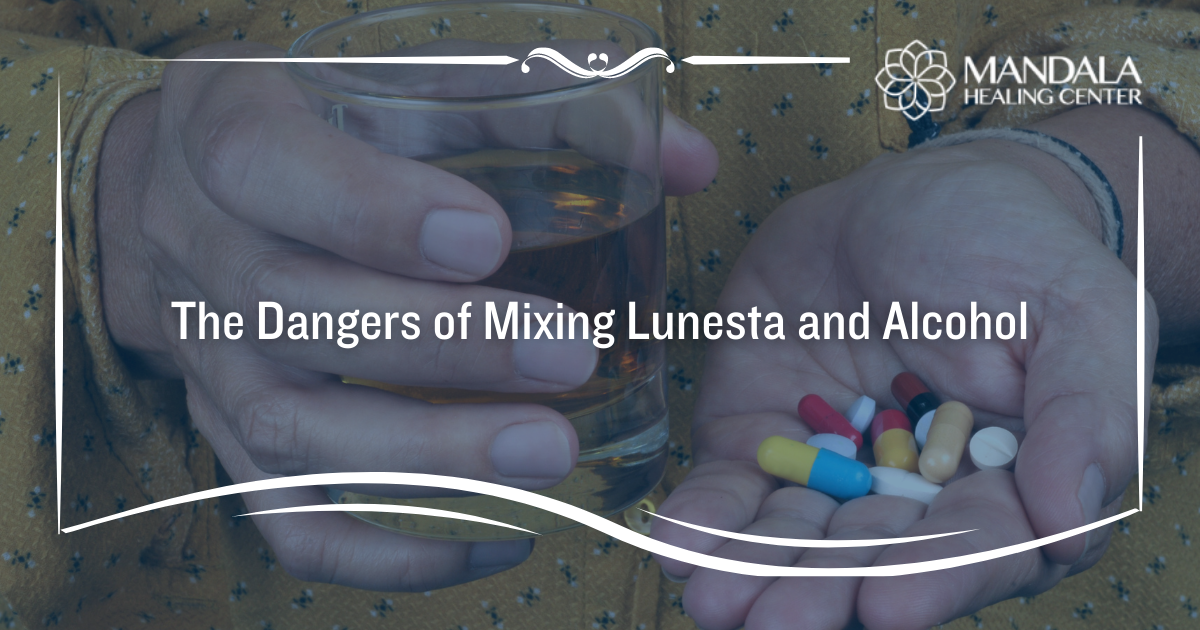According to the Centers for Disease Control (CDC), “14.5% of adults had trouble falling asleep and 17.8% of adults had trouble staying asleep.”[1]
Insomnia is a condition that causes sleep difficulties. For some people, this means having a hard time falling asleep. For others, it may mean difficulty remaining asleep.
While insomnia is not life-threatening, losing sleep can cause you to have trouble functioning in your daily life. As a result, many people with insomnia take medications to help them fall and stay asleep throughout the night. Most of these medications are safe to use, however, they are not intended to be taken in combination with other substances like alcohol.
One of the most common medications used to treat insomnia is known as Lunesta (eszopiclone). If you take Lunesta, it is important to be aware of the risks you could face if you mix it with alcohol.
How Does Lunesta Work?
Lunesta is the brand name for a sedative-hypnotic medication known as eszopiclone. This medication is believed to be safer than benzodiazepine hypnotic substances, as they are considered to be less addictive. However, your body can become dependent on Lunesta in a matter of weeks, causing you to build a tolerance and require larger doses of the drug.
With that being said, Lunesta is thought to help you sleep by increasing the reuptake of the gamma-aminobutyric (GABA) neurotransmitter in your brain which slows down activity in your central nervous system, causing you to feel relaxed and drowsy.[2] For this reason, Lunesta is a primary choice for people suffering from anxiety-related insomnia.
Some people may begin abusing Lunesta if they stay awake instead of going to sleep. When a person remains awake on Lunesta, they might experience a euphoric feeling, and when taken in high doses, it can cause hallucinations.
Because it is possible to get high on Lunesta, you must use caution when taking the medication. Taking this substance in high dosages can result in an overdose.
Side Effects of Lunesta
Like any medication, Lunesta can cause side effects. Typically, these side effects are mild and subside after taking the medication for a few days. However, if your symptoms continue you should consult with your doctor.
Common side effects of Lunesta include:[2]
- Headaches
- Pain
- Drowsiness during the day
- Lightheadedness and dizziness
- Loss of coordination
- Nausea and vomiting
- Strange behaviors during sleep, such as sleepwalking or driving
- Mood changes, such as depression, suicidal thoughts, or aggressive behaviors
- Heartburn
- Unpleasant taste in the mouth
- Unusual dreams
- Decreased desire for sex
- Painful menstrual periods
- Breast enlargement among males
Because of the risk of daytime drowsiness, you should only take Lunesta when you have enough time to sleep for 7 to 8 hours. Waking up earlier than 7 hours after you consume the medication can cause you to be drowsy, lightheaded, and experience decreased coordination.
The Dangers of Mixing Lunesta With Alcohol
When you are prescribed Lunesta, your doctor or pharmacist will warn you not to drink alcohol while taking the medication. While you might believe this means not drinking alcohol at the same time as consuming your medication, that is not the case for Lunesta. In fact, you should not consume any alcohol while the substance is in your system.
Alcohol and Lunesta are both central nervous system (CNS) depressants. Combining two CNS depressants can lead to an increase in side effects or a life-threatening overdose. Lunesta is also a long-acting medication, so it can stay in your system even after the effects wear off, and may continue to interact with alcohol for some time.
Amplified Side Effects
Lunesta can cause serious mood effects in some users, like aggression, confusion, depression, or even suicidal thoughts. If you are taking Lunesta and drinking alcohol at the same time, these mood-related effects can increase. Combining eszopiclone and alcohol can cause you to behave aggressively, engage in risky behaviors, and even self-harm or attempt suicide.
Unfortunately, these effects can occur up to 48 hours after you take your medication. You should not drink alcohol until Lunesta is completely out of your system and you have consulted with your doctor.
Addiction
Some people will stay awake after taking Lunesta to experience a euphoric and drowsy high. They may take large doses of the drug to experience hallucinations. Unfortunately, people may also mix Lunesta with alcohol to heighten the mind-altering effects of the medication.
Aside from this being incredibly dangerous, taking Lunesta with alcohol can result in an addiction. Over time, your body will become dependent on and tolerant of both substances. If you attempted to suddenly quit taking alcohol and Lunesta, you would experience symptoms of withdrawal.
Overdose
Mixing alcohol and Lunesta can result in a life-threatening overdose and respiratory depression.
A Lunesta and alcohol overdose may include the following symptoms:
- Severe drowsiness
- Nausea and vomiting
- Trouble breathing
- Staggering
- Unconsciousness
- Coma
- Death
If you are experiencing the symptoms of an overdose, contact emergency medical services immediately.
Find Help for Lunesta and Alcohol Abuse
Combining Lunesta and alcohol can become deadly quickly. If you find you can’t stop drinking even after being directed to do so by your doctor, it may be time to go to rehab.
At Mandala Healing Center, clients are taken on a journey of healing through complete immersion into evidence-based clinical modalities, multifaceted alternative therapies, and expert medical management, allowing them to fully detox and recover from drug and alcohol addictions. Through a program of care designed to encourage change, a foundation is created that allows clients to find their higher purpose and reclaim their lives.
To learn more about our alcohol rehab program, contact Mandala Healing Center today.
References:












